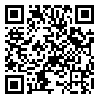Volume 12, Issue 1 (Volume12, Issue 1 2024)
CPJ 2024, 12(1): 1-15 |
Back to browse issues page
Ethics code: IR.KHU.REC.1402.057
Download citation:
BibTeX | RIS | EndNote | Medlars | ProCite | Reference Manager | RefWorks
Send citation to:



BibTeX | RIS | EndNote | Medlars | ProCite | Reference Manager | RefWorks
Send citation to:
Seyed mohseni V, Keramati H, Abdpllahi M H, Hassan abadi H R. Comparing the effects of two educational methods, Montessori and Robot-based in students' executive functions. CPJ 2024; 12 (1) :1-15
URL: http://jcp.khu.ac.ir/article-1-3816-en.html
URL: http://jcp.khu.ac.ir/article-1-3816-en.html
, keramati@khu.ac.ir
Abstract: (1763 Views)
The objective of the present study was to compare the impact of two distinct educational approaches, namely the Montessori and robot-based methodologies, on students' executive functions. The research design was quasi-experimental, with two experimental groups and a post-test and follow-up. A total of 34 available female students from the second elementary grade were selected from the schools where Montessori classes were held. The students were free from physical or mental impairments and did not exhibit learning disorders. Each experimental group received one of the training methods in 12 sessions of 75-90 minutes. Following this, the post-test and follow-up were conducted using the Wisconsin tool to evaluate cognitive flexibility, the Stroop task to evaluate response inhibition, and the Cornoldi task to evaluate working memory. Multivariate mixed-variance analysis was employed to analyze the data. The findings of the study indicated a significant difference between the two educational approaches in enhancing students' executive functions (p<0.01). Additionally, the subscales of executive functions (as defined by Miyake, 2000) demonstrated significant differences, thereby corroborating the efficacy of the Montessori educational method in fostering cognitive flexibility and response inhibition. However, with regard to working memory, the robot-based educational method was found to be of greater importance. Due to the nature of the Montessori education method, which is based on fully targeted tools and activities, the above results are acceptable; Also, due to the sequence of programming in educational robots and the need to use previous information and pay attention to the previous stages of coding, the effectiveness of robot-based education is also acceptable.
Type of Study: Applicable |
Subject:
Educational Psychology
Received: 2024/04/15 | Accepted: 2024/06/19 | Published: 2024/06/19
Received: 2024/04/15 | Accepted: 2024/06/19 | Published: 2024/06/19
Send email to the article author
| Rights and permissions | |
 |
This work is licensed under a Creative Commons Attribution-NonCommercial 4.0 International License. |





